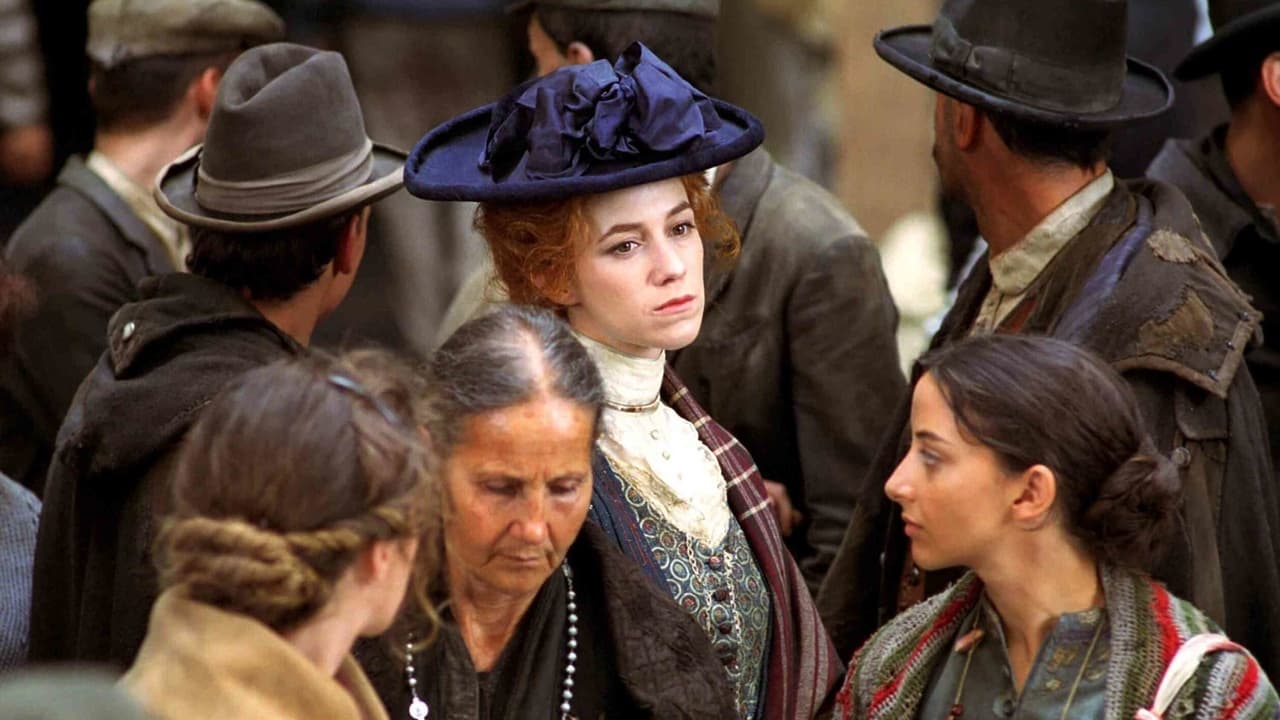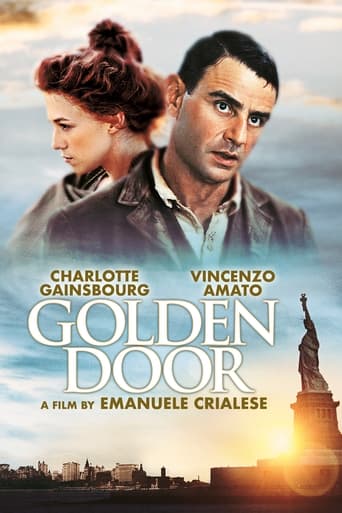



Yawn. Poorly Filmed Snooze Fest.
Waste of time
Very disappointed :(
The film may be flawed, but its message is not.
I suppose the 'Golden Door' of the title of this film is that small patch of water just in-front of; level with and partly yonder The Statue of Liberty in New York. It's that small, minute space in which Europeans know they're about to enter the nation of the United States of America and begin a new life. Or are they? The film is all about those little moments in life; those instances in which you have to take a minute to breath and recognise that things are, indeed, about to change rather drastically: the leaving of the Italian port to the sound of a deafening foghorn; that first meeting with a potential suitor, while remembering where you were and how you felt as well as the very first glimpses of America as you huddle around widows in immigration halls.Remember that very short but rather upsetting passage of cinema in the second Godfather film during which a ten or so year old Vito Corleone arrived in America from Italy and couldn't catch a break at immigration control? I always found that tiny segment quite upsetting, and wanted the film to revolve around young Vito's troubles at that locale a little more. The Golden Door uses that setting, indeed that scenario, as its rousing finale. The film builds to that concentrated moment during which the characters have come so far but cannot get over the line; that moment when all they believed was actually challenged by the reality of the situation.Ultimately, the film is about what individual characters think, feel and believe rather than immigration from Europe to America back-in-the-day. There is a certain degree of anxiety and conflict right near the end when it transpires certain characters' beliefs are challenged by these formal, suit wearing officials in the immigration office; housed within the 'new' world. There doesn't seem to be any room for those deemed 'different' to everyone else; no room for the shaggy dressed, elderly women who has been brought up for the last several decades on specific thoughts and spiritual practises.The film follows a poor, rural family by name of Mancuso whom live on the island of Sicily, just off the coast of Italy. The lead is named Salvatore (Amato); the head of a household whom head for Ellis Island with many others seeking a new life at the turn of the 20th Century. The first time we see Salvatore, he is partaking in what the film is essentially about: beliefs. He, as is an acquaintance, are carrying rocks in their bloodied mouths before laying them down somewhere specific and saying a prayer. What follows is a very bizarre and ritualistic scene involving an elderly spiritual woman and a much younger woman, with the elderly woman attempting to extract a supposed wriggling sensation from the younger one's belly. Again, these are spiritual and somewhat classical beliefs engaged in by those living on the notion they are true to life and work.The Golden Door is essential split into three different segments. The first is set in rural Italy and covers poor, backward even, people carrying out ideas and getting by. The beliefs are ancient and very spiritual; the people omit feelings of desperation and dream of lots of food, milk and money. The second third involves a developing of these emotions; an ingredient of lust as pretty British woman Lucy (Gainsbourg) becomes the clear object of a lot of male passenger's gaze as she strolls around the large boat transporting everyone to the new world. There is a certain hopefulness as the new land draws nearer; a certain anticipation as paradise is supposedly weeks away. This is additionally captured by the tiny narrative that opens up to do with Lucy searching for a husband and that, after meeting Salvatore, she is hopeful he will be the one, even if the right 'time' has not arrived where she can say she loves him. It is a poignant parallel in regards to the characters' overall predicament whilst waiting for this new world.The final third pushes the ideas to the forefront of questioning and examination, nicely captured by actual examinations on human beings by other human beings. The clashing of the old and new; the classical and the modern and of the science and the spiritual is just as awkward as it is humbling as it is fascinating. The film certainly carries that slow-burning and epic feel, punctuated by minute branches off into surrealist realms of fantasies and impossibilities. It does well with what it has at its disposal, namely scenes on the deck of the ship and the sense that this huge boat is casting off; soon to be midway across the Atlantic, when really, it's a series of rather small-ish sets.The Golden Door must cover several thousand miles or so over a span of several months but it never really feels like it. Whether that should count as a criticism or not, I'm not actually sure. The film is more a study of the smaller, more concentrated occurrences and emotions felt by people; the fact it just happens to play out amidst a several thousand mile journey on a massive ship is a mere coincidence. The film is brave; brave for the filmmakers to take on something so grand for a study so much more fitted to smaller scales.
View MoreBeing a history buff, I rented this movie because of the subject matter. The idea of the Ellis Island experience at the turn of the century focusing on one small group is intriguing. Unfortunately, the movie falls flat. Much of the story is simply boring; nothing much happens for long stretches. The director uses goofy imagery (offered up in the form of daydream sequences) in an apparent attempt to break up the glacial pacing, but instead, it clashes with the authentic look and feel of the movie. The characters are also poorly drawn. In the end, we don't really care as much about them as we should. It's a shame that this wasn't what it could have been. I would still like to see a good movie about the American immigrant experience, but this one isn't it.
View MoreAlthough there are some beautiful cinematographic moments, witty scripts, morally benign intention, and promising acting here and there in the film, I regret to say that the film is not good enough to win a Silver Lion (but I have to admit that I haven't seen all films in the competition).I was impressed by the initial and the ending scenes. In the beginning, the magnificent mountain in Sicily shows how tough it is to live there; in the end, the milk river shows how difficult it is for the Italian immigrants to struggle in a murky stream full of uncertainties. Another brilliant scene is when the boat was leaving the harbor, splitting the crowds on the land and on the boat into two, with the rhythmic noise of the boat engine in the background.Apart from these well-framed visual presentations, the film also shows some witty conversations from the Mancuso family (e.g. the dad's hack on the blocks IQ examination), and strong acting from Vincenzo Amato (as Salvatore Mancuso) and Aurora Quattrocchi (as Fortunata Mancuso).The director, however, did not handle the time on the boat well. The nebulous feeling between the Mancuso family and Lucy Reed did not sweeten up the unpleasant experience of immigrants on the boat. Instead, it spoils and endures the difficult time on the boat. Or, perhaps even worse, the existence of Lucy Reed is not necessary at all. This character weakens the whole plot, making everything alienated and inconsistent.Despite the unsatisfactory arrangements, the issues presented in this film do show that immigration policies haven't changed much through time and space. Today, immigrants, particularly those who want to enter the border of the US, Canada, Australia, the EU, all need to go through the equally, if not more, painful and prolonged process. This film certainly mirrors the inhumanity in immigration policies across time and space.
View MoreStranger things have happened than the director of 'Respiro' seeing the well-worn and much-loved opening credits sequence for Monty Python, and allowing his memory to resurface in the opening of this epic as two young men, now in close-up, now tiny and lost in the aerial microcosmic pattern of hill rocks, pieces of stone jammed in their bleeding mouths, struggle to the holy cairn at the top to ask a vital question. Simultaneously two girls, bearing promises of marriage to (perhaps) rich foreigners and photos of giant vegetables and American streets paved with gold, are persuaded to throw the photos away; the pictures are taken by a dumb lad to the cairn just as the eldest, Salvatore (Amato), begs the Gods to tell "us" if "we" should stay, or leave. Salvatore, his family, which gradually grows as the story opens out, are joined by a lost and rootless English lady (Gainsbourg) who decides to join the family if she can, to gain entry into the Promised Land. The story right from the start looks like a coat hanger for the visuals, and it is a treat throughout for the eyes. The great break as the ship leaves home is handled in a completely unconventional way: A God's-eye view shows the heads on board and the heads remaining on shore slowly separating as the ship moves out, as if the crowd is a 'people cake' that has been sliced. The sheer brutality of the situation these people have to live through is leavened by this kind of camera-work, and by the occasional magic dream, as when the no-longer brooding Salvatore's face is showered by coins. The tensions, though, coming out of the struggle to leave the Old Country, survive the voyage and pass into the New Country, and the simple efforts of strangers to cope with each other, keep it fascinating. Whenever Aurora Quattrocchi, 'Mama', is on screen, it seems to shift round to her point of view, yet another layer. The episodic structure, too, adds to the illusion of it's being shorter than it is. There are as many apparent links to the coming century as to the past here - the scenes on the mountain look like Pasolini, and the three males could almost have been the Marx BrothersAfter the nightmare of travelling 'steerage', a storm in mid-Atlantic and the interminable and humiliating selection process and 'aptitude' tests at Ellis Island (lack of intelligence has been scientifically proved to be genetically inherited, and we do not want these people amongst our citizens), it remains ambiguous whether everyone has got through to the Land of Milk and Honey, or the Mean Streets. I would say on the strength of this, that if anyone has the guts to put up the money for a film of 100 Years of Solitude, Crialese must be your man. CLIFF HANLEY
View More